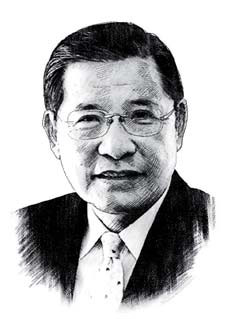Experts suggest the way ahead for China
Updated: 2016-03-04 08:00
(China Daily Europe)
|
|||||||||
China opened its largest annual political and legislative events - the two sessions - on March 3. China Daily takes a closer look at a series of likely hot topics and catchphrases during the sessions.
Editor's note: The eyes of the world are again focused on China as the annual sessions of the National People's Congress and Chinese People's Political Consultative Conference are convened. Apart from the regular agenda, this year's sessions will decide the 13th Five-Year Plan (2016-20). China Daily interviewed academics, diplomats and executives from multinational companies operating in China to hear their opinions, ideas and predictions.`
Q1
Which reform, policy or issue in China has impressed you most over the past year, and why?
Q2
Which challenge, issue or problem should be the first priority for the Chinese government in 2016?
Q3
What are your expectations for the Chinese economy this year?
Q4
What opportunities do you think the development of China will bring to your country, industry or to rest of the world in the next five years?
Q5
If you had the opportunity to talk with Premier Li Keqiang face to face, what would you most like to ask him?

Sung Won Sohn, professor of economics at California State University Channel Islands in Camarillo, California
A1 The change in the composition of output from an industrial to service-oriented economy has been impressive. Chinese consumers will begin to enjoy the fruits of their labor. The service sector of the economy, which has exceeded 50 percent of GDP, includes sectors such as healthcare, social services, sports and entertainment. Financial market liberalization is further significant progress. Interest-rate controls have been relaxed and some of the shackles in the currency markets have been removed, even though capital movements are still controlled.
A2 Whenever there are economic issues to be resolved, the government tends to turn to rules and regulations. China's financial market is in no man's land between the market and government control. The uncertainty emanating from the hybrid system undermines confidence in the financial markets. In the foreign-exchange market, for example, the authorities are not comfortable with leaving everything to the market. The governor of the People's Bank of China has stated, "China will adopt the concept of managed convertibility", not allowing the market to dictate the value of the yuan.
A3 Progress toward economic and financial liberalization will continue. As rebalancing continues, consumption and services will become more and more important. As investment growth falls faster than consumption, economic growth will continue to decelerate.
A4 There are a number of long-term issues facing China, including rebalancing, financial reforms, debt and the environment. Will the Chinese government tackle the tough issues and be able to execute the reforms necessary to improve the long-term health of the economy? The leaders in Beijing face difficult choices. If reforms are implemented too quickly, the economy could slow rapidly, leading to a hard landing. If the reforms are dragged out slowly over a long period, the debt-to-GDP ratio would continue to rise beyond the already high level, followed by a long period of stagnation. Neither option is palatable, especially because they could engender social and political problems. How the government chooses to navigate the turbulent economic waters over the next few years will be important for the long-term future of the economy. What is at stake is China's ability to avoid the middle-income trap that so many other nations have fallen into.
A5 Would he be supportive of the kind of massive reform of state-owned enterprises initiated by former premier Zhu Rongji?

Charles Foster, chairman of US-China Partnerships and a board member of the Asia Society-Texas Center
A1 The foreign policy initiative I have been most impressed with over the past year has been President Xi Jinping's willingness to take major steps to end corruption. This is critical for China, as large-scale corruption undermines the best of programs and morale in society in general. Thus, it was a critical decision for Xi to root out corruption not only at the rural levels, but also at high levels in order to establish a mindset that corruption cannot be business as usual.
A2 There are so many, just like for the United States. Again, I think doing more of what has already been initiated, but in a much larger, comprehensive way - and that is a total war against pollution in major Chinese cities. Again, the highly publicized episodes of unacceptable, and even dangerous, levels of pollution, particularly in Beijing, is something that affects all of the populace, no matter what their status in life. Clearly this is an issue that took years to occur and is difficult both in terms of cost and scientific challenges.
It's critical for the government to create a comprehensive plan that will give the general populace an expectation that the issue of unacceptable and dangerous levels of pollutants will be dealt with within a reasonable time frame, irrespective of what will clearly be a huge financial cost. In fact, such a project, if handled properly, could be an overall stimulus to the economy and could stimulate development of new technologies, as well as deal with an issue that affects all developed and undeveloped countries across the globe. It could be the equivalent of a moon shot.
A3 One thing I have learned over the years is that commentators are often quick to write off China and be overly pessimistic. I'm somewhat confident and hopefully not overly optimistic that the Chinese economy will rebound in 2016 for the benefit of not only the Chinese people, but for the global economy, too.
A4 The opportunity that is most important in the US in general, and Texas and Houston in particular, would be the fact that the extraordinary development of the Chinese economy and creation of extraordinary wealth has now created conditions for Chinese companies and nationals to make significant foreign investments overseas, just like the US and Western countries have made significant investments in China. Chinese nationals and companies are already making such investments, and while there are always issues, overall investments are a win-win for the US. Chinese companies diversify their risk, gain legal access to technologies, and the US is able to gain additional sources of capital. For the US, it is a chance to further balance the trade between our two countries. These opportunities are particularly opportune for China and Texas, given the low price of energy, which creates opportunities for Chinese investment in order to solidify the future oil and gas needs of China at bargain prices.
A5 I would ask what plans China has to allow the yuan to fall further, and whether it is still considered to be overvalued against the US dollar. I would also ask about plans to modify current restrictions on the ability of individual Chinese nationals to transfer funds abroad for investment or other opportunities.

Igor Prerovsky, chief executive of Home Credit China
A1 We're impressed by the new consumer finance policy for national rollout and how China has made the promotion of inclusive finance a national strategy. In June, Premier Li Keqiang chaired an executive meeting of the State Council where a decision was made to expand the pilot program for consumer finance companies across the whole country to drive economic growth by consumption. As a provider of consumer finance, Home Credit is a follower and practitioner of inclusive finance. It coincides with China's national strategy. We hope to enable more mid- and low-income consumers to have access to financial services, to help them establish their first credit history by using our services and giving them an opportunity to be served by other financial institutions in the future.
A2 Although the global economic recovery is slow, and China is experiencing economic transformation, the improvement in so-called people-oriented policy is the first priority of the central government. This reminds me of a good Chinese word, fuzhi, which means a stable living environment, safe and peaceful social environment, and a relaxed and open political environment.
A3 We believe China's economic transformation has shown great potential for future growth. Consumer finance can play the role of a catalyst to directly contribute to the development of the macroeconomy. Compared with Europe, China has achieved significant growth on the economic front. Home Credit is confident that this kind of growth will continue in the country.
A4 For Home Credit, China is not just a vast market with a huge customer base. What is important is that, as the global economy is on the downturn, China maintains steady growth and we can generate profits. Besides, the market in China is really diversified, and China's Internet industry is leading the world, which brings new technology to Home Credit.
In the past two or three years, China's consumer finance industry has seen rapid growth. The Internet Plus concept has driven a further division of the industry into various niche sectors and accelerated its overall development. Today, Home Credit shares the successful experience we have accumulated in China with the other markets where we have operations.
A5 Is there any chance that you can experience Home Credit's financial services for consumers when you go to the countryside to see how they help to improve people's lives in the regions?

Eugene Clark, visiting professor of law at the College of Comparative Law, China University of Political Science and Law
A1 I have been most impressed with China's rapid e-commerce growth, which has been made possible by the convergence and coordination of many factors. The government has established well-thought-out plans regarding specific technologies, such as nanotechnology and robotics. The business-to-consumer side of the economy has been a shining star and a world leader. The variety of business models, uptake of mobile-commerce, the legal reforms in areas such as consumer protection and the establishment of specialized intellectual property courts, and the rapid expansion of infrastructure have combined to bring about dramatic growth in e-commerce.
A2 If there is a priority, it is on communication - top-down, bottom-up and in-between. While governments at the national and provincial levels must communicate their plans, so too should they listen to the needs of different regions, businesses and public sector levels. In the small-business sector, this will mean promoting a culture of entrepreneurship, availability of finance, ease of doing business, and other means to facilitate and unleash the power of small businesses to create new and innovative businesses.
A3 This will be a challenging year for China and for the world, but I'm confident that the long-term Chinese and world economies will resolve their issues and move forward. China will also continue to benefit from healthy competition, both from foreign companies as well as from within. The rivalry between the different business-to-consumer models of Alibaba and JD.com is a good example of how competition can lead to innovation and enhanced choice and benefit consumers.
A4 China is Australia's No 1 trading partner. Consequently, Australia's success is inextricably linked to China. Australia remains rich in natural resources that can provide the fuel for a sustained Chinese manufacturing economy, although coal is most certain to decline. As China's middle-class and consumer-driven economy expands, there will be significant opportunities for the Australian services sector to engage with China. Also important is the food industry, where Australia is in a good position to substantially increase agricultural exports to China. The China-Australia free trade agreement will help facilitate these trends.
A5 Any questions I would ask would revolve around the points mentioned above. More than anything, I would ask how I can help. There is much to be done, and as members of the human race, each must do their small part so that, collectively, we will make a difference and thereby achieve our goals.

Sarah Boumphrey, head of strategic, economic and consumer insight at Euromonitor International, a London-based market intelligence company
A1 The continuing reforms to the hukou (housing registration) system since 2014 have been the most important, and will continue to be key to driving economic growth in China. Urbanization is a crucial driver of growth, and empowering rural migrants is central to boosting consumption. China's urbanization levels are more than 25 percentage points lower than the average for developed economies, so the potential for further urbanization remains significant. Anything the government can do to boost urbanization and lessen urban-rural inequality is good for the economy.
A2 The most pressing priority is to continue the rebalancing of the economy toward consumption - avoiding the temptation to boost growth through policies that might re-stoke asset bubbles.
The government must continue along its reform path and continue to demonstrate its commitment to the reform process, even if the cost of this is slower headline growth. A second key challenge is to boost productivity, which will in turn drive economic growth and boost incomes and expenditure.
In the long term, China's demographic trends are a major challenge for the government. With the working-age population having peaked, China is aging before it has grown rich -in stark contrast to other emerging markets, such as India.
A3 We're expecting the Chinese economy to expand by 6.5 percent in real terms in 2016, a slight deceleration on the 2015 figure. Private consumption will continue to outpace real GDP, indicating some progress toward rebalancing the economy away from investment. The outlook for 2016 remains uncertain, with significant downside risks. This year, the government has to continue to work to manage an orderly slowdown.
A4 One opportunity is in the development of low-cost manufacturing away from China to sub-Saharan Africa. With wages seeing strong growth in China, Africa has a significant cost advantage. Ethiopia is already seeking to capitalize on this. Africa could be China's natural successor as the "workshop of the world".
As consumption in China continues to grow, then Africa, with its close links to China, is also in a good position to benefit from China as a consumer market, rather than solely as a destination for its natural resources.
A5 What are the government's main policy priorities for boosting private consumption in China in the next five years?

Alan Barrell, professor and entrepreneur in residence at the University of Cambridge's Judge Business School
A1 The continued focus on innovation and entrepreneurship - in the economy, business, and especially within the education system. Late last year, I had the privilege to work at a major National University Teachers Conference in Beijing, where government, academics and business focused on the critical importance of entrepreneurial education, and the successful startup and scale-up of new companies, as well as the invigoration of existing enterprises with new ideas, creativity and education.
I have been particularly impressed with the support given by the Chinese government in the higher education sectors to entrepreneurial education, including the work of Entrepreneur Training China, an organization with which some of us are collaborating from the UK.
A2 Stabilizing sustainable economic growth and rebalancing the economy to generate faster progress in domestic consumption and less reliance on exports remains key. Developing the service sector and manufacturing industry, and matching skill needs with talent coming through an increasingly effective higher education system, will be important. Employment and employability issues will need special focus and attention.
The stabilizing and appropriate regulation of public markets/stock exchanges, and the direction and regulation of emerging financial market sectors, such as online finance, will bring great benefit to the fast-growing end of the economy where smaller innovative companies are being born and struggling to grow and scale. Financial technology can become as important a sector in the key centers of financial strategy and management in China as it has become in London.
Balancing entrepreneurialism with regulatory evolution that still permits creativity and new business growth to flourish have been challenges to all nations - not just China -and the Chinese economy has grown faster, consistently, than all others of any size during the past three decades. Adjusting to managed, balanced, sustainable growth is challenging. But from my viewpoint, things are moving positively.
A3 It's often overlooked that growth of the Chinese economy is dependent on the overall growth of the world economy. China is, after all, the largest trading nation in the world economy. So it's dependent on what happens in its export markets overseas. The prospects for the world economy are not of significant recovery, nor major decline.
The Chinese economy, measured in macro terms, will do well this year to maintain 6 to 7 percent GDP growth. I'm assuming some economic recovery and progress in the world economy in making that statement.
And earlier points made about the rebalancing of the Chinese economy, with more growth in domestic consumption, will be important, as will the control and management of debt/borrowing.
Where the money is invested will be important. More focus on productive industry and overseas investment in industries that bring much-needed new technology to China, rather than just more investment in real estate, are trends I hope to see.
A4 The opportunities for the UK and Europe as China continues its global development are immense, as some of us predicted after the visits of President Xi to our continent - and especially the UK. Collaborations on joint research, and especially on attracting much more Chinese investment into the UK and Europe in sectors such as mid and high-technology (technology that will benefit Chinese industry and can penetrate Chinese markets), together with collaborative education and organization developments with more Chinese executives participating in investee companies in the UK and Europe, as well as more companies from both continents venturing forth to work together across the world- especially midsize companies - are areas of great opportunity for all.
Practical international expansion - more companies operating together across borders and cultures - and acceleration in the speed of progress would be of great value in stimulating world economic growth overall. Sectors where special progress is possible would be healthcare, pharmaceuticals, agriculture, clean technology, and advanced materials development, including nanotechnology. Robotics and machine learning will also offer great opportunities.
A5 Simply to enable the flow of young people to and from China - as we have seen in the past decade - with an open-minded approach to international education and collaboration, and to keep the pressure on the higher education system and industry to encourage imagination, creativity, innovation and entrepreneurship as key elements in the development of people.
Also to find ways to apply these kinds of principles to earlier stages in the education process, as I saw happening on my last visit to Beijing, where a pilot study looking at encouraging greater creativity in primary education is being undertaken. China during centuries of world history provided so many great inventions that have benefited the world economy and humanity. The release of creative energy could lead to a new age of super-inventiveness for China. I would like to convince Premier Li about that.
(China Daily European Weekly 03/04/2016 page16)
Today's Top News
Trump, Clinton scoop up key wins on 'Super Tuesday'
British PM threatened with 'no confidence vote'
70,000 may become trapped in Greece
'Grow people' for long-term China-UK relations
Points of view
Small island makes a big difference
Rubio, Cruz gang up on Trump in debate ploy
'Invented-in-China’ products to the fore at MWC
Hot Topics
Lunar probe , China growth forecasts, Emission rules get tougher, China seen through 'colored lens', International board,
Editor's Picks

|

|

|

|

|

|






